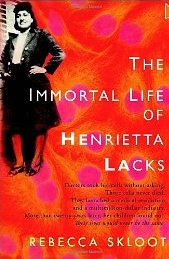January 5th, 2011 by Toni Brayer, M.D. in Better Health Network, Book Reviews, Opinion, Research
No Comments »

 If you like science, true history, and an engaging story, pick up the new book by journalist Rebecca Skloot, “The Immortal Life of Henrietta Lacks” and prepare for a great read. I knew nothing about the young black woman whose cells were taken back in 1951 by a scientist at Johns Hopkins Hospital and how those cells have revolutionized modern cell biology and research.
If you like science, true history, and an engaging story, pick up the new book by journalist Rebecca Skloot, “The Immortal Life of Henrietta Lacks” and prepare for a great read. I knew nothing about the young black woman whose cells were taken back in 1951 by a scientist at Johns Hopkins Hospital and how those cells have revolutionized modern cell biology and research.
The HeLa (named after HEnrietta LAcks) cells were taken as she lay dying on the “colored” ward at Johns Hopkins Hospital of aggressive cervical cancer at age 30. Everyone who studies basic cell biology has heard of HeLa cells because they were the first human cell line to be successfully grown in culture and they are alive today. HeLa cells were sent to researchers all across the globe and have been used to develop the polio vaccine, viruses, cloning, gene mapping and in-vitro fertilization. Billions of the same immortal HeLa cells are used by researchers fighting cancer, multiple sclerosis, heart disease, and diabetes. Read more »
*This blog post was originally published at EverythingHealth*
December 2nd, 2010 by Steve Novella, M.D. in Better Health Network, Health Policy, News, Opinion, Research
No Comments »

The controversy over the human consumption of meat and dairy products from cloned cows continues. The UK Advisory Committee on Novel Foods and Processes, after reviewing the evidence, concluded that there was no substantial difference between meat and dairy from cloned cows compared to conventional cows. However, food products from cloned animals and their offspring remain banned in Europe.
Use of offspring of cloned cows, sheep and pigs are legal in the U.S., South America, and Asia. Australia is likely to follow suit in a year or two. The European Union (EU) has an effective ban at the moment, but the policy is under review. The UK is also negotiating with the EU regarding the use of clones.
There is not much of a theoretical reason to suspect that cloned animals would present a health risk. The primary concern is that something unanticipated might have occurred during the cloning process, causing the animal to be genetically or developmentally abnormal. However, if the cloning process works properly this should not happen. Further, if mutations do occur but the animal lives, it is likely that any changes do not represent a risk to humans who consume the meat or dairy from such clones. Read more »
*This blog post was originally published at Science-Based Medicine*
 If you like science, true history, and an engaging story, pick up the new book by journalist Rebecca Skloot, “The Immortal Life of Henrietta Lacks” and prepare for a great read. I knew nothing about the young black woman whose cells were taken back in 1951 by a scientist at Johns Hopkins Hospital and how those cells have revolutionized modern cell biology and research.
If you like science, true history, and an engaging story, pick up the new book by journalist Rebecca Skloot, “The Immortal Life of Henrietta Lacks” and prepare for a great read. I knew nothing about the young black woman whose cells were taken back in 1951 by a scientist at Johns Hopkins Hospital and how those cells have revolutionized modern cell biology and research.











